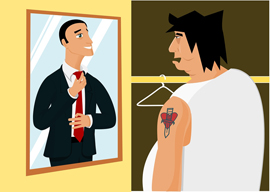
April 29, 2017

Source: Bigstock
What I really hate about Facebook is Mark Zuckerberg’s T-shirts.
Of course, his whole invention (if that is what one should call it) is an incitement to man’s reprehensible though no doubt eternal tendency to self-expression when he has nothing whatever to express. Even worse is its encouragement of both the exhibitionism of those who would rather be known as monsters than not be known at all, and the sadistic prurience of the public. The recent live-streamed murder of a 74-year-old man and the hanging of an 11-month-old baby by his father in Thailand for the delectation of both perpetrator and viewer were therefore only to be expected, in outline if not in detail.
But this is nothing compared with the civilization-subverting message and quality of Zuckerberg’s T-shirts. Like the celebrity-philosopher Slavoj Žižek, who claims to believe in the necessity of terror and mass murder for the future happiness of the world, he dresses like an incompletely washed slob. I suppose dialectical materialists would cite the similar taste in clothes of Zuckerberg and Žižek as an instance of the unity of opposites, the billionaire and the allegedly revolutionary philosopher.
I do not know what element of conscious playacting there is in their adoption of the T-shirt as their formal attire: whether, in short, they are the modern equivalent of Marie Antoinette, who liked to play the shepherdess for the afternoon before resuming her more accustomed role as queen. Perhaps in private both Zuckerberg and Žižek dress with great elegance, though I rather doubt it (especially in Žižek’s case). And we all know what happened to Marie Antoinette.
Are they playing the egalitarian, I wonder, and if so, why? It is unlikely that either of them wants to be in the actual position of someone who wears T-shirts because he can afford nothing better or more expensive. As a Marxist of the mass-murder-of-the-bourgeoisie persuasion, it is clear why Žižek should wish to appear as if he is relaxing after a hard day’s work down at the iron foundry wrestling with pig iron (the kind whose production was on an ever-upward curve in Stalin’s Russia), but the case of Zuckerberg is less clear. It is possible, I suppose, that as a purveyor of drivel to the masses, he rather fears to appear very different from them, in case they should get the idea that his product is but a cynical ploy to exploit them.
Of course, it is also possible that Mr. Zuckerberg’s T-shirts are expressive of the real him, that they are the mirror of his soul. I am not quite sure whether in this, as in other similar instances, it is better if he is playing a part or expressing his true self. I speak as a sartorial moderate, that is to say as someone who is halfway between a dandy and a slob.
Dandyism, as the writer Arnold Bennett pointed out in a beautiful little essay, may well be an expression of vanity, but it is vanity of a relatively harmless kind, and does at least also express an aspiration to perfection that requires an effort to approach. Moreover, insofar as it seeks the admiration of others, it does at least recognize the existence and importance of others. Slobbery, on the other hand, is expressive either of an indifference toward others or of an active desire to insult them. It is the expression of a vanity of a different and far worse kind. A slob is all-important to himself.
As there is slobbery in clothes, so there is slobbery in manners, which often masquerades as informality. My slight acquaintance, Alexander McCall Smith, created the delightful character of Mma Ramotswe, the only lady detective in Botswana, whose attractiveness for audiences of many millions around the world is surely connected to the ceremoniousness of the African life portrayed in the books in which she appears, a ceremoniousness that has been lost almost everywhere.
That ceremoniousness is sometimes thought to be not only a waste of time (and time is money) but, far worse from the intellectuals” point of view, to be inauthentic as well, insofar as it involves forms of words that do not express real individual thoughts or feelings. And the authentic person is under the obligation to be always sincere. If I don”t actually care a jot how you are, I shouldn”t ask you; and if I do ask you, it should be because I really want to know how your varicose veins are getting on.